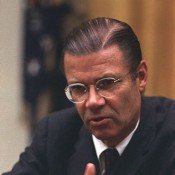Monday, July 6, 2009
Robert McNamara, U.S. Secretary of Defense under Presidents John F. Kennedy and Lyndon B. Johnson, died this morning at his home in Washington, D.C. He was 93.
McNamara is remembered as the "primary architect" of the Vietnam War, directing the troop buildup in Southeast Asia, costing more than 58,000 American lives. The war, tore "the national social fabric" asunder, according to The Washington Post, and obliterated McNamara's early record as a leading business executive and "chieftain of foreign financial aid."
[M]ore than 40 years after the fact, he was remembered almost exclusively for his orchestration of U.S. prosecution of the war in Vietnam, a failed effort by the world's greatest superpower to prevent a communist takeover of a weak and corrupt ally. For his role in the war, McNamara was vilified by harsh and unforgiving critics, and his entire record was unalterably clouded. For the rest of his life, he would be haunted by the Vietnam ghosts.
Previous Comments
- ID
- 149333
- Comment
Has anyone seen 'The Fog of War?' It's a really striking documentary, done as a series of interviews with McNamara somewhere around 2003. He used math & statistics to orchestrate the firebombing of Japan in World War II, going for the most demoralizing targets. After that, he worked for an auto manufacturer (I think Ford) and invented the shoulder-mounted seatbelt. Then of course he went on to oversee the Vietnam War. The documentary interviews McNamara looking dead-on into the camera instead of the customary 3/4s view. The result is a real intense experience with this man sometimes justifying what he did, and sometimes experiencing regret. Really interesting (and the reason we were watching it in my Making Moral Decisions class) is the way he uses the mathematics of what he did to verbally absolve himself of any real responsibility, even though the viewer detects a hint of regret in his eye. Anyhoo, Netflix that sucker; it's good.
- Author
- darren
- Date
- 2009-07-06T11:06:37-06:00
- ID
- 149335
- Comment
What struck me most about the film is the ending. He desperately wants to frame the discussion in terms of lessons for future policy makers. It's clear that he thinks the decisions he made on Vietnam were disastrous, but he is intent on keeping the discussion as impersonal as possible. When the interviewer finally puts him up against the wall and asks him about his guilt, McNamara becomes visibly uncomfortable and refuses to address the subject. If he was "vilified," it was because he was a villain who helped to kill two to three million people in Southeast Asia, in service of the flimsiest strategic objectives. That said, in the last moment of the film, he had the look of someone who would scream for a thousand years if he opened his mouth, that he was crushed by guilt. May God have mercy on his soul.
- Author
- Brian C Johnson
- Date
- 2009-07-06T13:07:39-06:00
